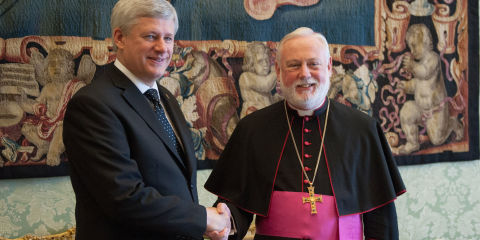What the F*ck Is Going on up in Canada?
Stephen Harper has designs on being a Christian oil sheikh.
Our neighbors to the north are fixing to have themselves an election on October 19. Canadian election night is one of my favorite regular programs on CSPAN because the CBC feed comes from the Parliament Building, the interior of which looks like a castle and makes the telecast look like one of those News From The Middle Ages things that CBS used to run on Saturday mornings. And a right nice election it is shaping up to be.
It's very much a referendum on aspiring oil sheikh Stephen Harper. His primary opponent seems to be Justin Trudeau, of those Trudeaus, the leader of the liberal party. The even more liberal New Democratic Party seems to have swerved into a ditch in recent days. But, since the Canadians have that parliamentary system, we may not know what's really going on until the returns from Yellowknife come in. I usually stay up for that anyway just to see the Canadian anchors say, "the Yellowknife riding," which is not a euphemism, but should be.
MORE FROM ESQUIRE
Harper, of course, having learned all the wrong lessons from the Bush-Cheney-Halliburton years, has been going to Trump University this time around, making a national issue of any Canadian civil servantwho wants to wear a niqab.
Harper then went further, saying the Conservatives are examining Quebec's Bill 64, which requires Muslim women or others who wear face coverings to remove them if they want to work in the public sector — or do business with government officials. Although tabled in the Quebec National Assembly, the bill has yet to be debated. On Wednesday, Harper praised the Quebec Liberal government's measured approach and pledged that when it came time for federal legislation, he would follow their lead. "I believe the Quebec government has been handling this controversial issue in a responsible manner and we will do exactly the same thing in Ottawa," Harper said during a campaign stop in Saskatoon where he touted the Conservative plan to expand parental leave benefits under employment insurance.
Once uncorked, xenophobia rarely stays in the bottle. If it's not questioning someone's citizenship, it'sgood old-fashioned nativism.
The government's move to help establish Nunavut had not been successful, he suggested. "We even created Nunavut and it has been less than satisfying as far as the result goes for them," he said. "Nunavut is not that great an experience," said Sagala. "The violence there is comparable to South Africa. "We tried to do some delegation of power to them and this is what happened," he added.
He sounds nice.
Apparently, Harper loves the way, say, the Qataris do their oil business, but doesn't think that much of their religion. A Christian oil-sheikh, just as Jesus intended. But the tactic seems to have roiled up the campaign enough that Trudeau and the Liberals have lost their footing.
Trudeau, in London, Ont. to tout the party's proposed new Canada Child Benefit, said Wednesday Harper's divide-and-conquer approach "is unworthy of the office he holds and he needs to stop because no election win (is) worth pitting Canadians against Canadians." Mulcair said what Harper was doing was "dangerous" and part of a broader political strategy aimed at getting the Conservatives re-elected by accentuating differences rather than bringing Canadians together. "Stephen Harper is reminding us every time he does this why he doesn't deserve to be prime minister," Mulcair said.
Pardon me, gentlemen. But have you met the United States House Of Representatives?
Anyway, the issues up there go beyond politically salient xenophobia. Unlike this country, the condition of the Native peoples of Canada is a subject of serious consideration in the national election. The NDP has promised to spend $4.8 million to improve the schools among the Native peoples. Trudeau, on the other hand, has made an issue of the infrastructure in those communities, especially those parts of the infrastructure having to do with of drinking water.
Earlier in the day, Trudeau released his full package of campaign promises, an 88-page plan that includes billions pledged for infrastructure projects, including investments in water facilities, as well as a commitment to First Nations education of $750 million per year over the next four years. Trudeau's promise came on the same day as the Neskantaga First Nation, which has has the longest-standing boil-water advisory in the country of more than 20 years, made an appeal for the next prime minister to intervene personally to address the issue. More than 300 people in the northern Ontario reserve have been forced to live under a boil-water advisory since 1995.
First of all, these poor people have been under a boil-water regime for 20 freaking years. And, second, when was the last time you heard any presidential candidate in this country say a word about our deplorable ongoing treatment of Native Americans. Bobby Kennedy used to talk about it a lot, if I recall correctly.
And then there's this fellow. I would break election laws in both countries to vote for this man.


No comments:
Post a Comment
Please leave a comment-- or suggestions, particularly of topics and places you'd like to see covered